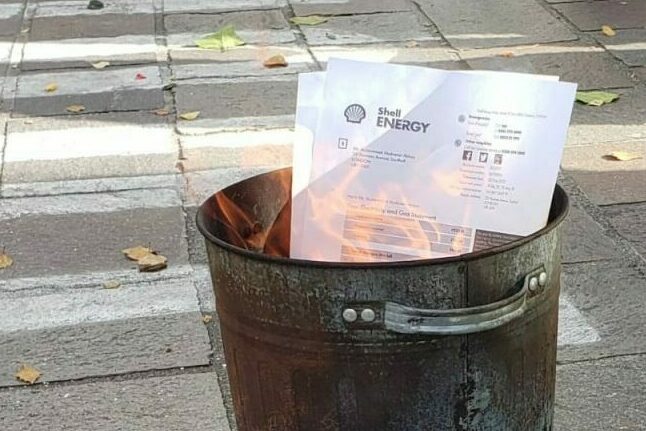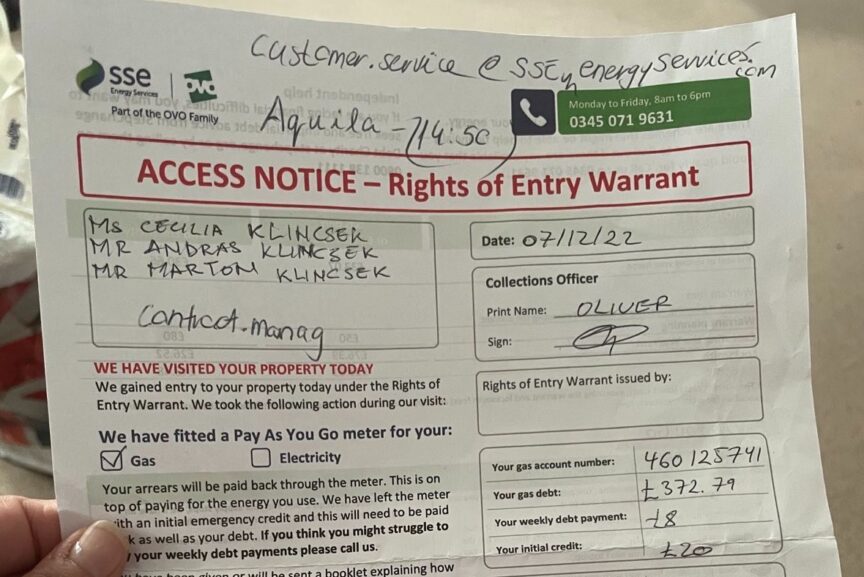Wait, Are We on Energy Bill Strike Now?
Providers are waging war on defaulters - campaigners say we must fight back.
by Charlotte England
16 December 2022

Last week, an energy company broke into Cecilia Klincsek’s home while she was out running errands. With the help of a locksmith, an engineer sent by the provider installed a pre-payment meter without her consent and failed to activate it, leaving Klincsek, her husband, her five-year-old daughter and her elderly mother without heating or hot water.
As temperatures plummeted across the country, Klincsek describes crying out in pain as she took ice-cold showers – all because the family were £372.79 behind on their gas bill.
When Novara Media reported the story on Thursday, OVO Energy quickly switched the family’s power back on.
Klincsek said she was immensely relieved, but the incident had left her traumatised. “I feel scared that the company will invade our home again because we are still in debt,” she said.
“I want everyone to know this has happened. I know we are not the only ones.”
She’s right: rising energy bills have already left three million households in debt to their providers. A recent investigation revealed almost half a million ‘utility warrants’ had been issued since Britain ended lockdown measures in 2021, allowing energy companies to forcibly install prepayment meters. Often granted through opaque procedures, these warrants fail to consider the vulnerability of those affected.

Mass resistance?
Concerned that many would face a choice between “heating or eating” as energy prices doubled, campaign group Don’t Pay called an energy bill strike for the start of this month. Over the summer, hundreds of thousands of people pledged to cancel their direct debits until a price cap was imposed. But when, under immense pressure from frightened energy companies, Liz Truss went a small way towards meeting their demands with an ‘energy price guarantee’, it scuppered the campaign’s goal of one million pledges by 1 October and – when the cap was revoked – forced a change of start date, leading to a dip in support.
Midlands-based organiser Simon Howard told Novara Media there was no “denying that there was a loss of momentum perhaps on 1 October”. While Truss’s cap was “at least [a] partial victory” for the campaign, he believes that misleading media coverage meant “a lot of people somehow ended up regarding it as a defeat,” perhaps failing to strike as a result.
Some people Novara Media spoke to were confused by the campaign’s trajectory. Robert*, a carpenter from London, pledged to strike but hasn’t yet cancelled his direct debit because he didn’t realise the action was still going ahead. “I figured that because the website hadn’t reached one million pledges, the strike hadn’t been called,” he said.
But organisers stress that with “millions” of people like Klincsek defaulting on unaffordable energy bills and subject to violence from their providers, a strike is now more imperative than ever. “We’re at a point where we have to turn this mass default into mass resistance,” a Don’t Pay spokesperson told Novara Media.
Can’t pay.
Ebere’s* disabilities mean she needs more electricity than average to run lifesaving medical equipment. When, like Klincsek, she was unable to pay her energy bill, her provider passed her details on to a debt collector and threatened to install a prepayment meter.
Unable to travel to the shop to top-up a costly meter, Ebere felt she couldn’t risk striking. Instead, she scraped together what money she could to pay off some of her debt. After giving an entire cost of living payment to her energy provider, she said she felt “suicidal”.
Others, too, are afraid to strike without numbers behind them. Anna*, from London, enthusiastically pledged when the Don’t Pay campaign first launched in June – but today, she is still paying her energy bill. “I was relying on the one million pledge threshold to feel that safety in numbers,” she said, “and to be honest, especially in the context of the broader cost of living crisis, without that I just feel too worried about the consequences of striking. I am already facing a lot of precarity right now with a rent rise and a possible eviction.”
Some people, however, have honoured their pledge. Joe Davies, a Don’t Pay coordinator from London, hasn’t paid his energy bill since October – as an act of solidarity with those who can’t, rather than out of necessity. “I am [striking] because I think it is criminal that profits are being prioritised over people,” he said.
Monica, an organiser in London, also went on strike in the autumn. She said she did this out of choice, to resist “a system where profits are privatised and losses are collectivised.” But with another price hike scheduled for April, she acknowledges that “won’t pay” could quickly become “can’t pay”. In November, she said, her energy bill doubled – even before she’d switched on the heating.
Howard, meanwhile, cancelled his direct debit on 1 December. While his family “would not be put on the breadline” by rising costs, a significant chunk of his income was being spent heating his home. “I want a proper national conversation over energy and how it ends up in our houses – who pays for it, who profits from it,” he said.
Don’t Pay is calling on more people to join the strike immediately. “The crisis is already here, now,” the spokesperson said. “We have to do everything we can to fight for each other, to protect our communities and for a different future.”
Additional reporting by Sophie K Rosa.
*Names have been changed.
Charlotte England is a director and deputy head of articles at Novara Media.


